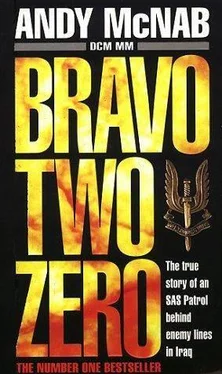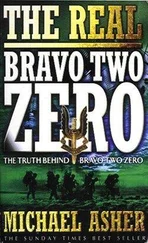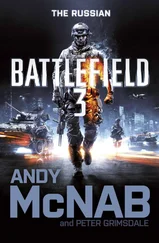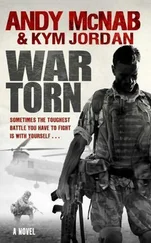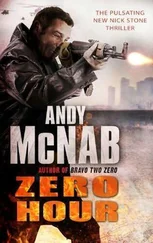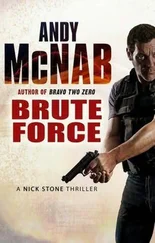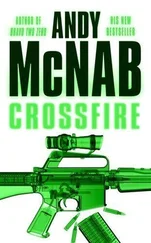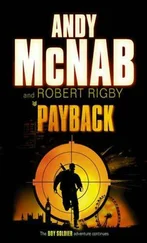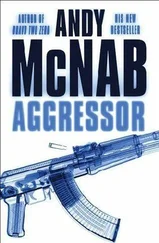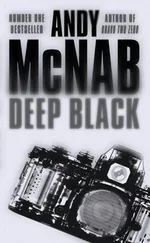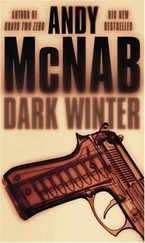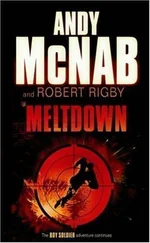Then we heard, “Russell! Russell!”
There was a mumbled reply.
Further down the corridor there was the same banging of buckets. Then “David! David!”
This one was definitely American. When he heard his name called, he replied with a resounding “Yo!”
The guards were shouting at this David character. They shut his door and came down the corridor to our cell. The door opened and we got to our feet. We didn’t know what to expect. There were three of them: one little bloke who said we were to call him Jeral, one big fat thing with glasses, and a really young kid with curly blond hair. Jeral carried a bucket while the others covered him, pistols drawn. They seemed keen to throw their weight around with the new blokes on the block.
“Names?” the fat one demanded.
“Dinger. Stan. Andy,” Dinger said.
He handed us three small plastic bowls, into which he tipped a small ration of rice and water mixture from the bucket. We were issued with two more mugs and given a brew of cold black tea from a battered old teapot. I thought it was Christmas.
When they left we had our first chance to look around the cell in daylight. There was a nail high up one wall, sticking out a couple of inches from the cement surface. Deciding it might come in handy, I as the lightest was given a leg up and jiggled it until I managed to prize it free. Dinger used it to mark where the light was shining on to the wall, as some sort of check on the passage of time.
We sat down and ate the rice, licking the bowls clean. We took sips of cold tea as we pondered what might happen next. The same three guards returned ten minutes later with the major.
“You’re in my prison now,” he repeated. “I want no misdemeanors from you. If you cause me trouble, I will return the compliment. You’re only together because the officer yesterday decided to put you together. He says to inform you that we know that you are dangerous men, and that if we have any trouble with you, we are to just shoot you.”
It must have been a reference to the COP platoon story, which made us an unknown quantity compared with the airmen they were used to. Either that, or because we looked like wild men of the north with our matted beards, scabs, and bruises.
“Any attempt to escape or to aggravate us and we’ll shoot, it’s as easy as that,” he said.
“Is there any possibility of emptying our bucket, sir?” I asked. “We have bad stomachs and it is filling up.”
He gob bed off to one of the blokes and said, “Yes, take the bucket.”
Stan picked it up and followed a guard.
The major said, “You will be fed, and you’re lucky to be fed because you’ve come over here to kill our children. There is to be no noise-no talking, no shouting. Do you understand?”
While he was talking, Dinger spotted the outline of a cigarette packet under his shirt.
“Excuse me, sir, is it possible that I can have a cigarette?”
Dinger was smiling away. Nothing ventured, nothing gained. We were trying our hardest to come over as friendly, nice, polite, and courteous. The major unbuttoned his shirt and took the pack from a pocket in a T-shirt underneath. He handed Dinger a cigarette, but he didn’t give him a light, so that was Dinger fucked. He spent the rest of the day looking at it wistfully and holding it under his nose.
Stan had tried to gather as much information as he could. All he could tell us was that there were a number of cells, with the doors sealed with blankets or rice-sack covers that were marked, ironically, FROM THE AMERICAN RICE BOARD TO THE PEOPLE OF IRAQ. At the bottom of the corridor there was a gate, and another corridor that led out into a courtyard, with yet another metal gate beyond that. That was as far as he had been able to see. Everything seemed to be self-contained within the one unit, with only one way in and out.
It appeared that we shared the ablution block with the guards. Their washing was hanging on lines. In one corner was a large oil barrel which was filled with water. There was a long concrete sink with about four or five taps coming off it, and normal Arab toilets which were blocked as usual. According to Stan the whole place stank.
A week passed. Sometimes they would come into our cell three times a day, sometimes twice, sometimes six or seven times. We could hear squad dies continually toing and froing, doing their washing, and just generally mooching about.
We were fed irregularly as well. Sometimes the bucket would come at breakfast time, sometimes in the late afternoon, sometimes at last light. Meals always consisted of rice soup or boiled rice, real dreggy stuff with grit and mud in it. They always told us we were lucky to have it. One time we were given bones that people had been chewing. We tucked in hungrily.
They must have watched one of those prison films where you get indoctrinated by radio, because every morning at first light they turned on a radio that then blasted away outside our window. It was like having a loudspeaker blaring into the cell, aggressive rhetoric punctuated by the occasional English word like “Bush” or “America.” Then there would be prayers, then the rhetoric would start up again. It only stopped at last light, and it drove us all crazy.
We were bombed every night. There had always been sporadic firing around the city from antiaircraft guns, some of which were sited in our compound. We’d feel the shudder of the guns on our roof and hear the sounds of the gun crews arguing and shouting. What they never seemed to realize was that by the time you’ve heard an aircraft it’s out of range anyway.
On the night of the 13 ththere was a massive amount of small-arms fire in the streets around the prison, which went on for twenty to thirty minutes.
“What the fuck’s going on here?” Dinger said.
He and Stan lifted me up to the slit window, and I just managed to pull my head up high enough to see tracer going horizontal. It was bouncing everywhere.
“Must be some form of revolution or coup going on. That is one major firefight.”
A few nights later we decided that we’d try and make contact with the characters in the other cells. We knew that the bloke next door was called David and was an American. We weren’t sure about Russell. We decided to initiate some form of contact with them. We risked a beating or worse if we were caught, but we decided it was worth it. If they were released or escaped, they could report our names.
Last thing at night, when the guards finished their duty, they would close up the main gate from the corridor and then go out to the courtyard. It was a fair assumption that once we’d heard the final gate close, they would be out of earshot. I got right up to our door, covered by its rice bag, and called for help. If a guard responded, I would just say that one of us was really ill and needed attention.
We heard nothing.
I called out, “David! David!”
We heard rustlings, and then “What? What?”
“How long have you been here?”
“A few days.”
He said that he and another transport driver, a woman, had strayed over the border and been shot. He had received a stomach wound, but had no idea what had happened to the woman.
“Who’s further down?” Dinger asked.
“A Marine aviator called Russell.”
“Russell! Russell!”
He responded and we all swapped names.
“What have you heard?” I asked him.
Russell Sanborn had been shot down by a SAM missile while at 10,000 feet over Kuwait. He’d only been in the prison for a couple of days. We concluded that we were the only prisoners and agreed we would try to talk again.
One morning, on about the 15 thor 16 th, the guards came in, and we stood up as usual and smiled at them. We’d got a bit of a routine going now. We’d say “Good morning,” and they’d say “Good morning” back, and one of us would then go out and empty the bucket.
Читать дальше
